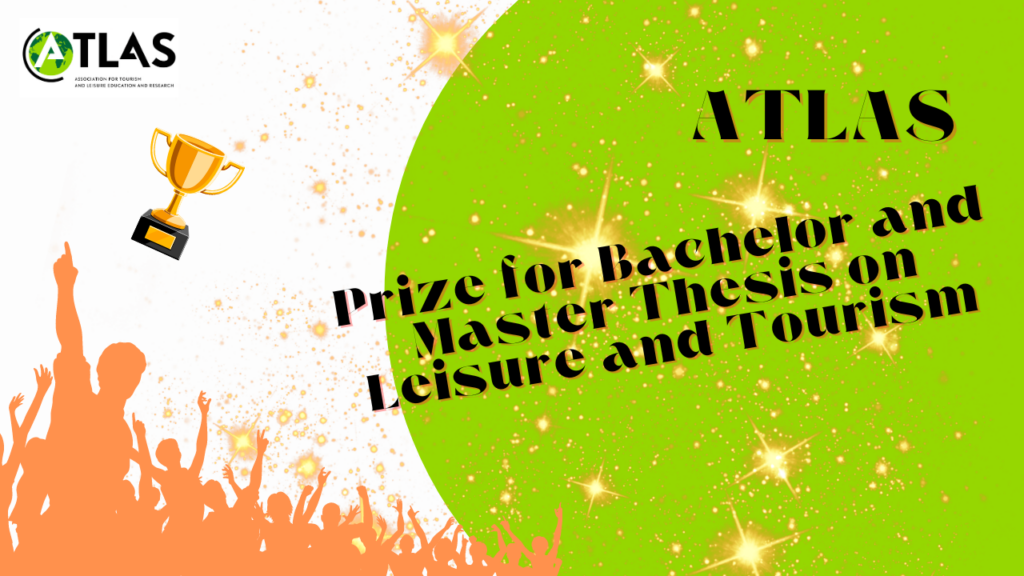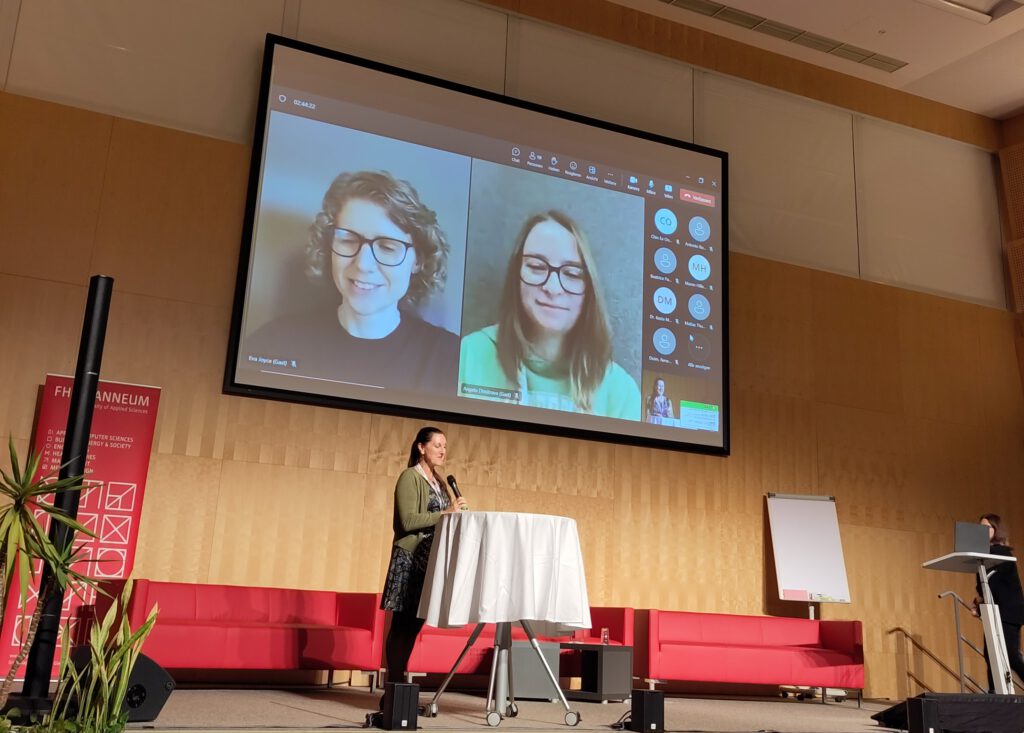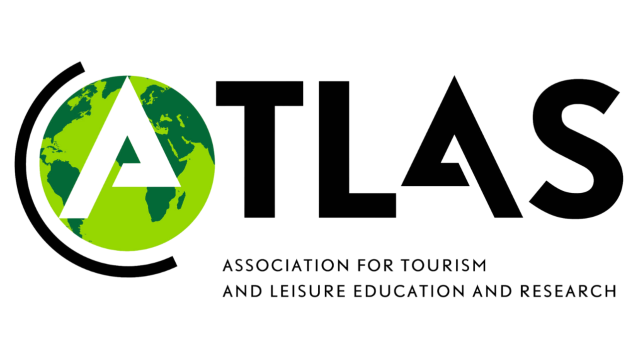ATLAS Thesis Prize

ATLAS Thesis Prize 2025
The Association for Tourism and Leisure Education and Research (ATLAS) has established an annual ATLAS Prize for undergraduate and graduate theses on leisure and tourism.
Nominations for the prize (a maximum of one undergraduate and one master’s thesis per institution) should be submitted by heads of departments from ATLAS member institutions, by providing a statement (maximum one page A4) explaining why their nominee is worthy of the ATLAS prize for undergraduate and master’s theses on leisure and tourism.
The thesis must have been successfully defended by 2024 and must be written in English. Given the variety of possible topics in the field of leisure and tourism, we do not specify precise criteria. Possible grounds for the award include scientific and social relevance, originality of the topic and readability.
Nominations will be reviewed by the ATLAS Advisory Board in May and June 2025 and the 2 award winners (one for the best Bachelor thesis and one for the best Master thesis) will be announced at the ATLAS Annual Conference in June in Vila-seca, Spain. The awardwinners will receive a framed certificate. They will also be invited to present their work during a webinar and receive a free ATLAS student membership for one year.
The closing date for entries is Friday 4 April 2025.
To nominate please fill in the form HERE (form will be activated in January 2025)
The thesis in PDF format should be submitted by e-mail to admin@atlas-euro.org.
ATLAS Thesis Prize 2024 – The Winners
The Association for Tourism and Leisure Education and Research (ATLAS) has created the annual ATLAS Prize for Master and Bachelor theses on leisure and tourism. Nominations were made by Heads of Department / School from ATLAS Member institutions, In addition, theses produced by ATLAS student members were also considered.
Nominations were reviewed between May and September 2024 by the ATLAS Advisory Board and we now have 4 prize winners, 2 master and 2 bachelor students AND a special acknowledgement!
ATLAS Master thesis prize 2024
For the 2024 thesis prize for Master theses, we received 8 nominations. The Jury had a hard time making a final decision. The quality of most of the theses was very high, the topics were very interesting and relevant and the methodology of the research projects well justified.
First prize
Jimena Natalia Diamint
In the clouds or on solid ground? Mapping KLM’s dominant and counter-discourses on aviation and climate change
The prize winner this year is Jimena Natalia Diamint. The thesis deals with a really important topic: KLM’s dominant and counter-discourses on aviation and climate change. Based on a well elaborated literature review, theoretical and conceptual framework and a properly justified methodology, the thesis offers detailed and intelligent findings and therefore makes an important contribution to the debate about sustainability.
Second prize
Junanto Junanto
Destination’s sustainability storytelling: Its interpretation, implication, and implementation
The second prize goes to Juanto Juanto with a unique topic and an interesting thesis about storytelling and sustainability. Based on an appropriate and quite a novel methodology storytelling is defined and discussed really well and critically – a good distinction is made between sustainability communication and storytelling.
Special Acknowledgement
Joey Y.P. Chan
A Voyage to Transformation A Spiritual-Hermeneutic Approach
This year the jury would also like to acknowledge Joey Y.P. Chan’s fascinating philosophical, spiritual and personal piece of work. The thesis of Chan makes an excellent contribution to theoretical understandings of spiritual tourism and transformation based on an excellent literature review. The autoethnography is interesting and deeply touching, but unfortunately has less of a wider significance than some other theses.
ATLAS Bachelor thesis prize 2024
For the 2024 thesis prize for Bachelor theses, we only received 3 nominations.
First prize
Tamara Stasinska
Virtual museums: Towards exploring immersive experience in VR
The prize winner this year is Tamara Stasinska who made a very good critical analysis of VR use in museums. Based on an innovative and well elaborated methodology, Tamira created a well-written thesis with interesting findings and a nicely elaborated discussion of the results.
Second prize
Femke Pasnagel
Travelling with autism: An excluded topic in the world of inclusive tourism
The second prize goes to Femke Pasnagel. Her thesis about traveling with autism is original and societally highly relevant. Based on a detailed analysis of the characteristics of autism and excellent discussion about inclusive tourism, her thesis offers interesting and impactful findings.
ATLAS Thesis Prize 2023 – The Winners
The Association for Tourism and Leisure Education and Research (ATLAS) has created the annual ATLAS Prize for Master and Bachelor theses on leisure and tourism. Nominations were made by Heads of Department / School from ATLAS Member institutions, In addition, theses produced by ATLAS student members were also considered.
Nominations were reviewed between May and September 2023 by the ATLAS Advisory Board and we now have 4 prize winners, 2 master and 2 bachelor students!

ATLAS Master thesis prize 2023
For the Master thesis prize we received 9 interesting nominations. The quality of the nine theses was high. After careful consideration, the Jury has decided to award the ATLAS 2023 Master thesis first prize to Eva Joyce. The jury also highly commended Angela Dimitrova (second prize).
The thesis of Eva Joyce from the Linnaeus University in Sweden integrates Foucauldian and socialist ecofeminist theories into a multi-level discourse analysis of 35 online news media articles (2017-2022) on rewilding tourism from 8 trusted news outlets in the Republic of Ireland and the United Kingdom. This very well structured thesis is based on an extensive literature review, which is both critical and eloquent, and makes both a theoretical and practical contribution to understanding how tourism discourses influence rewilding’s practical role in supporting biodiversity and environmental restoration. The thesis topic is very well researched and the writing style is sophisticated.
Angela Dimitrova of Breda University of Applied Sciences (the Netherlands) deals with the development of online leisure practices by players of Elder Scrolls Online, one of the most popular Massively Multiplayer Online Role-Playing Games (MMORPG). Her research explores the role of events and festivals in developing MMORPG communities. She used content analysis and netnography of digital feeds and chats from the game as well as participant observations of actual game play. More depth was added by carrying out interviews with players, selected through criterion-based sampling. This multi-faceted approach helped to reveal many interesting insights into the nature of the Elder Scroll practices. Angela’s thesis deals with an original topic in leisure and event studies, which clearly addresses a gap in the literature in a convincing way. Conclusions tightly connecting theory and practice. The thesis is written in an interesting and engaging way and shows a remarkable level of academic writing and analysis.
ATLAS Bachelor thesis prize 2023
For the Bachelor thesis prize we received four very different projects. Based on careful considerations, the jury has decided to award the ATLAS 2023 Bachelor first prize to Aaron Godfrey. The jury also highly commended Radina Shikova (second prize).
Aaron Godfrey from Ireland looked at emotional intelligence in resilient leadership, a topic rarely tackled by students because of its complexity. The research project builds on a well-executed literature review and research design. Interesting questions were asked which yielded some insightful and original data. The data is presented in multiple forms, which heightens interest and allows for a full exploration of the important findings. The analysis chapter provides an intelligent and critical summary of the data too. The work is very concise and clearly written. It is carefully structured and flows well.
Finally Radina Shikova from Bulgaria looked at the role of nature-based tourism during the COVID-19 period. Her thesis is well structured and written and findings rest on a well elaborated theoretical (using practice theory) and methodological framework. Research results are interesting and support findings elsewhere on the consequences of COVID 19 for (nature- based) tourism.
